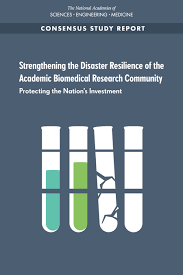Howard Hughes Medical Institute
See the following -
Academic Biomedical Research Community Should Take Action to Build Resilience to Disasters
 The academic biomedical research community should improve its ability to mitigate and recover from the impacts of disasters, says a new report from the National Academies of Sciences, Engineering, and Medicine. The consequences of recent disasters, from hurricanes to cyberattacks, have shown that the investments of the U.S. federal government and other research sponsors -- which total about $27 billion annually -- are not uniformly secure. The report recommends 10 steps that academic research institutions, researchers, and research sponsors should take to bolster the resilience of academic biomedical research.
The academic biomedical research community should improve its ability to mitigate and recover from the impacts of disasters, says a new report from the National Academies of Sciences, Engineering, and Medicine. The consequences of recent disasters, from hurricanes to cyberattacks, have shown that the investments of the U.S. federal government and other research sponsors -- which total about $27 billion annually -- are not uniformly secure. The report recommends 10 steps that academic research institutions, researchers, and research sponsors should take to bolster the resilience of academic biomedical research.
- Login to post comments
More on Open Access Publishing
Over the past 20 years, open-access publishing has become a major part of the scholarly landscape. It is now common in astronomy, maths and physics, where most researchers submit their work to the open-access repository arXiv.org before it is published, and is on the rise in the life sciences and other fields....Worldwide, more than 200 institutions and 80 research funders require their researchers' work to be open access, according to the Roarmap registry (roarmap.eprints.org). Read More »
- Login to post comments
New Imaging Technique Overturns Longstanding Textbook Model of DNA Folding
 How can six and half feet of DNA be folded into the tiny nucleus of a cell? Researchers funded by the National Institutes of Health have developed a new imaging method that visualizes a very different DNA structure, featuring small folds of DNA in close proximity. The study reveals that the DNA-protein structure, known as chromatin, is a much more diverse and flexible chain than previously thought. This provides exciting new insights into how chromatin directs a nimbler interaction between different genes to regulate gene expression, and provides a mechanism for chemical modifications of DNA to be maintained as cells divide...
How can six and half feet of DNA be folded into the tiny nucleus of a cell? Researchers funded by the National Institutes of Health have developed a new imaging method that visualizes a very different DNA structure, featuring small folds of DNA in close proximity. The study reveals that the DNA-protein structure, known as chromatin, is a much more diverse and flexible chain than previously thought. This provides exciting new insights into how chromatin directs a nimbler interaction between different genes to regulate gene expression, and provides a mechanism for chemical modifications of DNA to be maintained as cells divide...
- Login to post comments
Study Identifies a Way to Prevent Burn Injury Infection – Without Antibiotics
 A new way to fight multidrug-resistant bacteria by blinding them rather than killing them proved highly effective in a model of burn injuries, UT Southwestern Medical Center research shows. “In the United States, there are more than 1 million burn injuries and 100,000 hospitalizations annually. Up to 75 percent of the mortality in burn patients is associated with infections, which are particularly common in patients who suffer extensive burns – those that cover 40 percent or more of the body,” said Dr. Steven Wolf, Section Chief for Burns and Professor of Surgery at UT Southwestern Medical Center...
A new way to fight multidrug-resistant bacteria by blinding them rather than killing them proved highly effective in a model of burn injuries, UT Southwestern Medical Center research shows. “In the United States, there are more than 1 million burn injuries and 100,000 hospitalizations annually. Up to 75 percent of the mortality in burn patients is associated with infections, which are particularly common in patients who suffer extensive burns – those that cover 40 percent or more of the body,” said Dr. Steven Wolf, Section Chief for Burns and Professor of Surgery at UT Southwestern Medical Center...
- Login to post comments